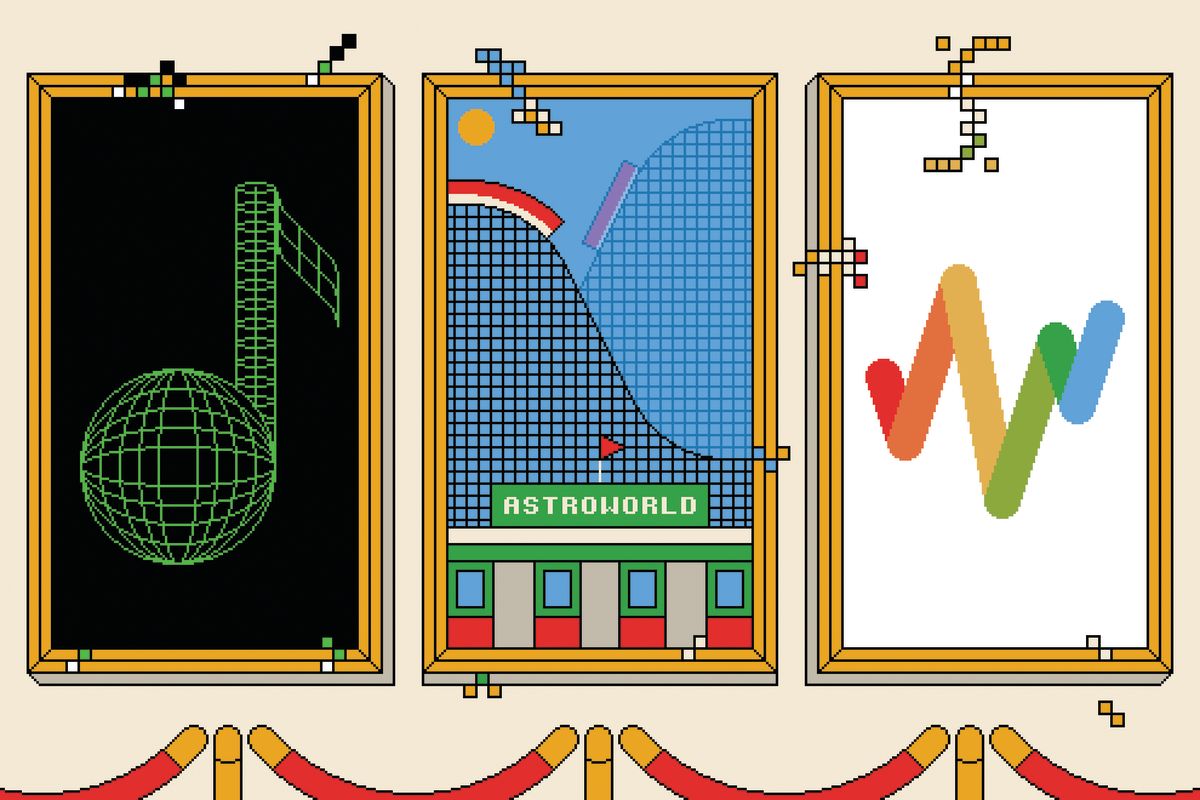Houstonia Magazine
2799 Katy Freeway, Suite 250, Houston, TX 77007
Phone: 713-862-4570 • Fax: 713-862-4606
By Shelby Stewart Published in the Summer 2022 issue of Houstonia Magazine
Meet the tech wizards who are changing the way we look at art in Houston.
Image: Nick Little
Technological advancement is unfolding before our eyes—not least in the world of cryptocurrency, digital art, and their conception as tangible assets. Houston is a city that leads by its innovation, and we’re witnessing this digital world infiltrate the city through several different mediums, such as NFTs.
NFTs (non-fungible tokens) are collectors’ items, but digital—the “one-of-a-kind” works can come in various forms, including digital images, videos, and songs. Sold online, usually through users’ crypto wallets, NFTs give indulgers ownership of a unique virtual item. Commonly, the purchase of an NFT grants owners exclusive rights for personal or commercial use.
While the concept may seem like a passing trend, data reveal that NFT dealers have pushed the market to $17.6 billion in sales in the past year. On top of that, NFT Marketplace Open Sea, where users can buy and sell NFTs, hit an all-time high in January 2022 with $5 billion in monthly NFT sales.
Houston-based business magnates are immersing themselves in a similar virtual space, taking stock in digital currency. Tilman Fertitta started a Bitcoin rewards program for his Landry’s hospitality group, and personal injury lawyer Tony Buzbee accepted the virtual coin for his former River Oaks estate.
By contrast, NFTs are opening the door for broader access: artists can create and sell their work online, and consumers can invest in and purchase digitized property while fully owning their acquisitions. And over the past year, Houston’s NFT landscape has grown, from the Chopstars “chopped not slopped” song remixes to a reimagining of the Houston Texans’ first franchise win in 2002 over the Dallas Cowboys.
Jose Cervantes says NFTs have the power to change the world as we know it. Cervantes is the creator of Astroworld DeFi, the world’s first virtual amusement park developed on the Ethereum blockchain, which is modeled after Houston’s historic defunct theme park.
“I think we can become one of the cities on the world’s stage with the adoption of NFT and cryptocurrencies,” Cervantes says. “Houston is well-positioned to lead in the NFT and blockchain space.”
“I think we can become one of the cities on the world’s stage with the adoption of NFT and cryptocurrencies,” Cervantes says. “Houston is well-positioned to lead in the NFT and blockchain space.”
Once Cervantes discovered the world of NFTs, it was a no-brainer for him to create a virtual Astroworld. The game offers nostalgia to him, both as the creator and as a gamer. Set to launch this summer, Astroworld tokens will program the 3-D open-world browser. The tokens will allow users access to the theme park, games, and rides via purchasing the park’s gaming season passes—or a lifetime pass, which runs $3,000.
Entering the world of digital art isn’t as linear for some. Erick Calderone was in the ceramic tile business for years before he began experimenting with generative art in 2017, discovering Larva Labs’ Cryptopunks project. The interactive, coded artwork served as his creative outlet from his day job until he decided to focus on his passion entirely and founded one of the most successful NFT platforms to date.
“I’ve always had a passion for art and technology and an interest in exploring how the two intersect. Early on, I spent time tinkering with a technology called projection mapping, which required me to use code to produce visual outputs,” Calderone says. “Upon discovering the Cryptopunks project, I realized the incredible potential of the technology behind NFTs.”
As a generative art pioneer, Calderone’s Houston-based company, Art Blocks, is an online community where users can buy, sell, and trade pieces that are static images, 3-D models, and interactive experiences. But the process is what separates Arts Blocks from the rest: the final product is delivered when the NFT is purchased. Buyers pick a generic style they like, buy the NFT, and an automated version of the work is created by the Art Blocks algorithm and sent to the collector’s Ethereum account. In this sense, the purchaser is part of the creative process—the art wouldn’t exist without them.
In addition to NFTs cultivating a space for mixed media, independent artists have found alternative ways to find investors through the digital universe.
Compared to listeners streaming or purchasing music on a platform like iTunes, where end users only have the license to listen to music, musical NFTs allow fans of artists a closer relationship, giving them legitimate ownership of music created by certain artists. Houston producer Apex Martin is leading the pack. Martin, whose production credits include Maxo Kream, Kanye West, and Travis Scott, partnered with Mint Songs, an audio NFT marketplace. His project, What We Doin Apex!?, is a seven-track EP where he sought 33 Ethereum coins as an advance to create the project, for which he traded 40 percent of royalties to his investors, giving them partial ownership.
“My goal is to eliminate the need for major-label backing,” the platinum-selling producer says, explaining his use of NFTs in the music industry. “This way, I get to keep control of the music within the community and myself.”
The users who back the project via the cryptocurrency Ethereum receive collectible NFT Apex tokens. The top bidders on the project get additional privileges, such as one-of-one album artwork NFTs, priority viewing of music videos, and early notice of future NFT releases from the producer.
While these three NFT adopters are approaching the technological assets from different avenues, each shared a similar sentiment: the Bayou City is a progressive conglomerate for creators.
Cha-Ching!
11/16/2021 By Shelby Stewart Edited by Nandi Howard
Crypto Art
03/09/2022 By Shelby Stewart
Casa For Crypto
02/16/2022 By Shelby Stewart
Bored Ape Burgers
04/05/2022 By Shelby Stewart
Author
Administraroot

